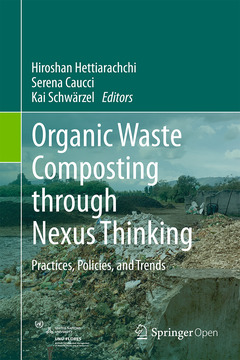Organic Waste Composting through Nexus Thinking, 1st ed. 2020 Practices, Policies, and Trends

This open access book starts with an introductory chapter that describes the need to bring the waste management aspects and soil nutrient management aspects of compost production into one integrated theme. The relevance of nexus thinking and the Sustainable Development Goals (SDGs) are also presented in this introduction. The first three chapters after the introduction covers composting from the solid waste management and its policy aspects, taking examples from three developing countries. The next three examples are mostly about the benefits composting can provide to the soil and agriculture. These examples are also from three developing countries, but with a mixture of urban as well as rural settings. Last three chapters present more insight into the latest developments taking examples from Europe, as well as new methods adapted from the traditional styles from Africa.
Date de parution : 11-2020
Ouvrage de 232 p.
15.5x23.5 cm
Thèmes d’Organic Waste Composting through Nexus Thinking :
Ces ouvrages sont susceptibles de vous intéresser

Biology of Composts 232,09 €


